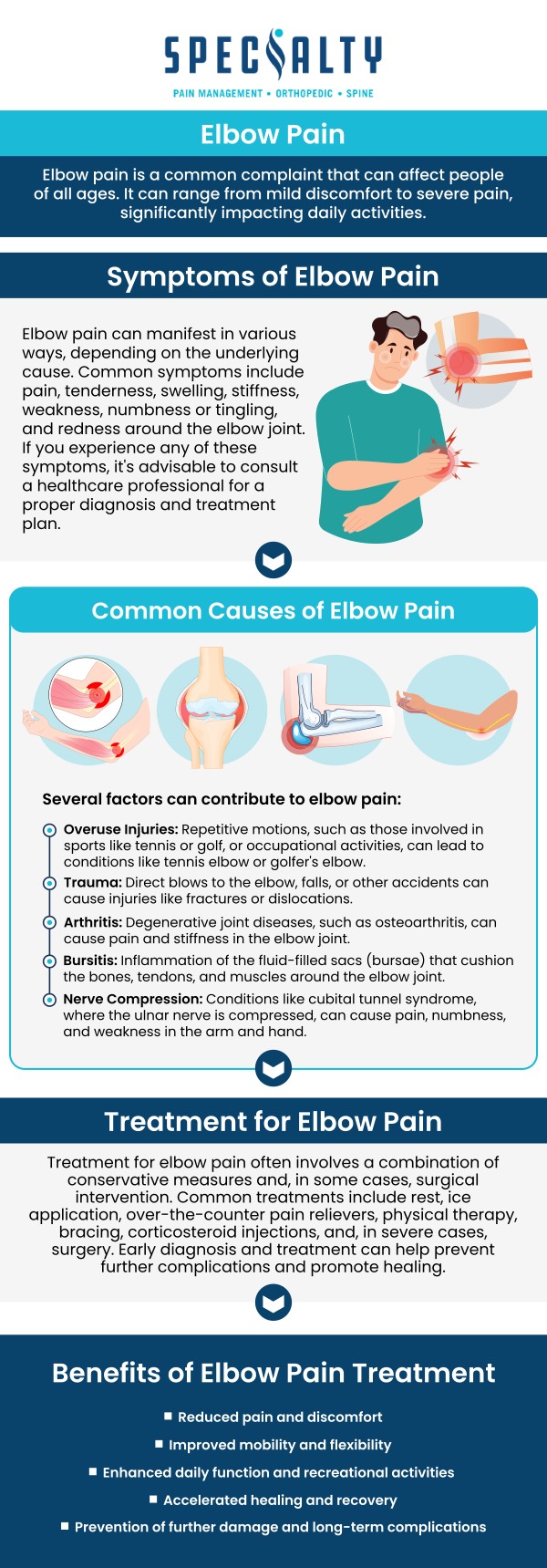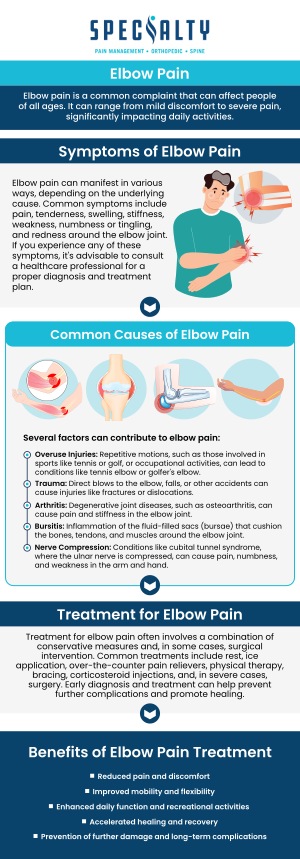Elbow Pain Treatment Specialist in Sterling Heights, and Dearborn MI
Elbow pain can be caused by something as simple as an acute injury, like a fall, or it could be symptomatic of a complex degenerative condition that if left unchecked, could impede an individual’s ability to move their elbow. Given the potentially serious, and degenerative nature of some of the underlying causes, it is important to consult a pain management specialist for elbow pain. A common cause in adults are arm muscles, elbow ligaments, tendons, bones in the arm, bursae. The treatments for elbow disorders depend on the underlying cause. Visit Specialty Medical Center today to get comprehensive and specialized care from board-certified physicians. For more information, contact us today or schedule an appointment online. We have convenient locations to serve you in Sterling Heights, MI and Dearborn, MI.




Table of Contents:
What is elbow pain?
What are the causes of elbow pain?
How do I know when my elbow pain is cause for concern?
When to see a pain management specialist for elbow pain?
Elbow pain, a commonly experienced condition, emerges due to damage to different elements of the elbow joint. Composing various structures and tissues facilitating forearm and hand movement, the elbow joint is susceptible to a spectrum of issues, ranging from minor to more severe.
Many instances of elbow conditions result from overuse or sports-related injuries, while less serious pain may be linked to acute incidents like bumps or falls. The origins of elbow pain are diverse, encompassing a broad array of potential causes which is reflective of its varying degrees of potential severity.
Given the potentially serious, and degenerative nature of some of the underlying causes, it is important not to ignore elbow pain. Due to the intricate nature of the elbow joint, symptoms of elbow pain can vary widely.
Your doctor, while evaluating your medical history and examining your elbow, will also inquire about any activities exacerbating the pain and explore additional symptoms such as limited range of motion or swelling.
Elbow pain has a wide range of potential causes. In fact, it is likely almost everyone has experienced elbow pain at one time or another. Elbow pain can be caused by something as simple as an acute injury, like a fall, or it could be symptomatic of a complex degenerative condition that if left unchecked, could impede an individual’s ability to move their elbow.
Beyond mere bumps or bruises, individuals may encounter more substantial, isolated injuries to their elbow, such as sprains, strains, dislocations, or fractures. Although these incidents are acute, they can heighten an individual’s vulnerability to specific chronic health issues.
Over time, wear and tear injuries manifest as you repetitively engage in certain actions, whether at work or during sports activities. These injuries, including bursitis, tennis elbow, and stress fractures, become more prevalent with age.
Additionally, chronic conditions like various types of arthritis, notably rheumatoid arthritis and osteoarthritis, can impact the elbow. The diverse range of potential causes of elbow pain reflects how common it is for individuals to experience it.
Given the wide range of potential symptoms and causes it can be difficult for an individual to determine the seriousness of their elbow pain. Because of this, elbow pain should never be ignored, as even seemingly minor symptoms may be indicative of a more serious problem. However, there are warning signs patients can pay attention to.
Elbow pain may be serious when it presents as severe pain or inhibits the movement of the elbow. When elbow pain does not resolve on its own despite precautions and home care it may indicate something more serious.
Numbness, tingling, or weakness in the elbow or the surrounding area could be serious. Additionally, whenever elbow pain is accompanied by additional symptoms such as a fever, this may point to an infection and requires prompt care.
When it comes to when to see a pain management specialist for elbow pain, each patient will be different. However, it’s important to remember you don’t need to wait until elbow pain symptoms become severe to visit Specialty Medical Center for care.
Although it becomes imperative to seek out a pain management specialist when elbow pain has lingered for upwards of 2 weeks, if it is presenting alongside additional symptoms, or if it is presenting alongside severe symptoms that impede an individual’s daily life.
Elbow pain can be indicative of many forms of chronic degenerative diseases that benefit greatly from early interventions. The specialists at Specialty Medical Center diagnose the root cause of elbow pain and work with patients to develop a custom treatment plan tailored to their unique needs.
Elbow pain treatment is available at Specialty Medical Center. We serve patients from Sterling Heights MI, Dearborn MI, Detroit MI, Birmingham MI, Allen Park MI, Warren MI, and BEYOND!

Additional Services You May Need
▸ Ablations
▸ Epidurals
▸ Facet Blocks
▸ Steroid Injections
▸ Platelet-Rich Plasma Therapy
▸ Bone Marrow Concentrate (BMC)
▸ Neurosurgery
▸ Spinal Disc Herniations
▸ Sacroiliac Joint Pain
▸ Nerve Pain Stimulation
▸ Orthopedics

Additional Services You May Need
▸ Ablations
▸ Epidurals
▸ Facet Blocks
▸ Steroid Injections
▸ Platelet-Rich Plasma Therapy
▸ Bone Marrow Concentrate (BMC)
▸ Neurosurgery
▸ Spinal Disc Herniations
▸ Sacroiliac Joint Pain
▸ Nerve Pain Stimulation
▸ Orthopedics
▸ Ulnar Collateral Ligament (UCL)
▸ Osteoarthritis
▸ Foot and Ankle
▸ Non-Union Fractures
▸ Physical Therapy
▸ Shockwave Therapy
▸ Laser Therapy
▸ Chronic Pain
▸ Spine
▸ Hip Pain
▸ Shoulder Arthritis
▸ Knee Pain
▸ Hand and Wrist Pain
▸ Shoulder Pain
▸ Neck Pain
▸ Back Pain
▸ Elbow Pain
▸ Sciatica
▸ Fibromyalgia
▸ Musculoskeletal Pain
▸ Auto Accident Injuries
▸ Work Injuries




